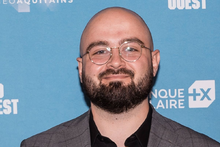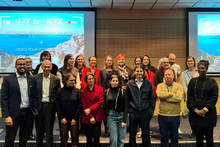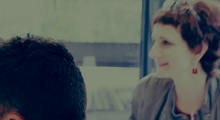2024 is all about you: your successes, your...

Portrait - Nicolas Dujardin, KEDGE graduate and Chief Operating Officer at Océinde
A 2011 KEDGE graduate, last January Nicolas Dujardin became the Chief Operating Officer (COO) of Océinde.
For this start of the new school year, the KEDGE Alumni Network invites you to discover the portrait and interview of Nicolas Dujardin, KEDGE alumnus and COO of the French group Océinde.
With more than 1,500 employees in six countries, Océinde is directed by a family block of shareholders. Since 1970, the company has stood out for its passion for innovation and industrial expertise, the creation of iconic brands and, most of all, for its courage and energy to act.
HIS BACKGROUND IN FRANCE AND ABROAD 🌏
An avid reader, Nicolas Dujardin naturally focusing on literary studies in secondary school. After he completed his leaving exams, he enrolled in KEDGE’s International Bachelor of Business Administration (IBBA) programme. Fascinated by Asia, he went on university exchanges in India and China then began his professional career in Shanghai as a Purchasing & Supply Chain Manager in the trade of manufactured goods and raw materials.
He returned to France in 2011 where he joined the Océinde group as Purchasing Manager. Between 2013 and 2017, he managed several departments (procurement, logistics, R&D and innovation, global business development). In 2018, a subsidiary was created in Senegal, and Nicolas was appointed its Deputy CEO & Administrator. Finally, at the beginning of 2021, he was appointed Chief Operating Officer.
INTERVIEW - NICOLAS DUJARDIN 💬
1. To begin, tell us about your educational background, your years at KEDGE, and your university exchanges?
After being accepted into the Franco-Asian programme, I started my studies in Marseille for 18 months. Then I started doing an MBA as part of an exchange programme at NMIMS University in MUMBAI for 9 months followed by the TONGJI University in Shanghai for one year.
As part of the university, we were able to discover new cultures, new ways of learning, and new ways of looking at our respective histories, habits, and customs. Those four years were rich in experience and extremely marked by the cultural contrasts between France and Asia.
At both NMIMS and TONGJI, the level of education was extremely high with constant surprises in terms of the organisation, language, subject matter, and perspective mixed - especially in India, where religion and the caste system affected with the teaching methods and course content
2. What are you doing today? What gave you the idea and the desire to do what you’re doing today?
In 2010, China was still the Workshop of the World and the focus of all eyes on the Shanghai World Expo. It was clear to me that completing my studies in Shanghai and enjoying this unique time for China was a must. I have always had an aptitude for industry and the concept of production, its material, "touchable", we know what we produce, transform and market; I understand this business and thrive in it. Purchasing was, therefore, an obvious choice of career in a country that I think of as being a single, gigantic factory, supplying the entire world and having to change its image; and in this sense, to do everything possible to achieve quality targets equivalent to those required in Europe or the USA. Being able to assist suppliers who are eager to improve and benefit from your knowledge is a golden opportunity for a buyer and a total win-win for both parties.
Today, China has gone from workshop to world factory, and it is largely around China that value chains are structured. Since 2010, China has been the world's leading exporter of merchandise and manufactured goods but has also become the leading importer of raw materials. In this sense, it has contributed significantly to the strong increases in global commodity prices since the 2000s, and even more recently in the wake of the global pandemic.
3. Would you tell us more about your responsibilities and describe your job?
As Chief Operating Officer, I am directly responsible for three departments: Purchasing/Approach, R&D, and International Development. This may seem surprising, but it actually fits in with the Supply Chain:
- Purchasing is at the origin of the manufacturing of our paints and therefore determines the quality, the price, and very often the market in which the finished product can or will be marketed;
- R&D can develop new products according to what Purchasing and supplier-partners can offer in terms of technology and provide relevant technical information and tips;
- International development to market these products and bring interesting innovations to Purchasing and R&D to source and study;
- It's a virtuous circle that benefits all of our departments and the common good.
In addition to these different areas, I have several responsibilities as Managing Director in Africa and Asia where I have recently created strategic partnerships with the setting up of manufacturing facilities. My role is to improve the profitability of the company through the productivity and performance of these different areas.
4. What are your development goals for the future?
We have a solid foundation and significant expertise in our core business, we must:
- Continue to maintain this solid base which is the foundation for more ;
- Take advantage of this base to conquer new export markets;
- Improve our service offer in favour of the environment, to meet demand and an awareness that is awakening in all of us.
5. If you were to give advice to KEDGE students and graduates who’d like to do something similar, what would it be?
Develop an insatiable curiosity. Cultivate and nurture your strengths, talents, and passions, and humbly use them in your career for the common good. It’s only from this perspective that your teams, companies, and employees will learn, grow, and contribute to the growth of your company.
6. Finally, would you tell us in a few words why you think it is important for a school to have a strong alumni network?
When thinking of the word “network”, the alumni networks of the great American universities, or "secret" societies such as the Freemasons, tends to come to mind. Personally, I prefer the Chinese definition of a network- the Guanxi "关系" - which comprises the circle of close relatives, parents, friends, but additionally includes friends of friends, former colleagues, classmates, etc., and which, above all represents a dynamic that is at your disposal to reach an ambitious objective. The Alumni network is an important component of this Guanxi and deserves to be cultivated and maintained as such to ensure that all individuals can exceed their individual goals. Something along the idea that "alone we go faster, together we go further".






0 Comment
You must be logged in to leave a comment.
No comment